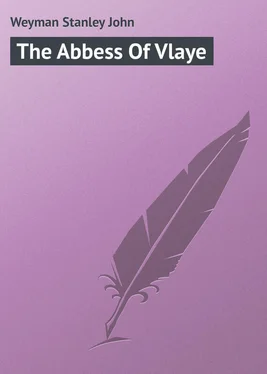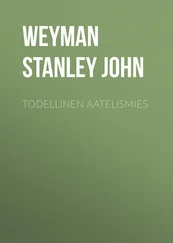Stanley Weyman - The Abbess Of Vlaye
Здесь есть возможность читать онлайн «Stanley Weyman - The Abbess Of Vlaye» — ознакомительный отрывок электронной книги совершенно бесплатно, а после прочтения отрывка купить полную версию. В некоторых случаях можно слушать аудио, скачать через торрент в формате fb2 и присутствует краткое содержание. Жанр: foreign_prose, на английском языке. Описание произведения, (предисловие) а так же отзывы посетителей доступны на портале библиотеки ЛибКат.
- Название:The Abbess Of Vlaye
- Автор:
- Жанр:
- Год:неизвестен
- ISBN:нет данных
- Рейтинг книги:5 / 5. Голосов: 1
-
Избранное:Добавить в избранное
- Отзывы:
-
Ваша оценка:
- 100
- 1
- 2
- 3
- 4
- 5
The Abbess Of Vlaye: краткое содержание, описание и аннотация
Предлагаем к чтению аннотацию, описание, краткое содержание или предисловие (зависит от того, что написал сам автор книги «The Abbess Of Vlaye»). Если вы не нашли необходимую информацию о книге — напишите в комментариях, мы постараемся отыскать её.
The Abbess Of Vlaye — читать онлайн ознакомительный отрывок
Ниже представлен текст книги, разбитый по страницам. Система сохранения места последней прочитанной страницы, позволяет с удобством читать онлайн бесплатно книгу «The Abbess Of Vlaye», без необходимости каждый раз заново искать на чём Вы остановились. Поставьте закладку, и сможете в любой момент перейти на страницу, на которой закончили чтение.
Интервал:
Закладка:
It turned out as she expected. M. des Ageaux lounged onto the terrace, and shading his eyes from the sun's rays, gazed on the prospect. She judged that he thought himself alone, for he took a short turn this way and that. Then, after a casual glance at the empty seats-empty as he doubtless judged, though she from her arbour of leaves could watch his every movement-he wheeled about, and, facing the château, seemed to satisfy himself that the wall of pollard elms sheltered him from sight.
His next proceeding was mysterious. He drew from his breast a packet, of parchment or paper, unfolded it, and laid it flat on the wall before him. Then he stooped and after poring over it, glanced at the view, referred again to the paper, then again to the lie of the country, and the course of the river which flowed on his left. Finally he measured off a distance on the map. For a map it was, beyond doubt.
A shadow fell on her as she watched him. Nor did his next movement dispel the feeling. Folding up the map he replaced it in his breast, and leaning over the wall he scrutinised the outer surface of the brickwork. Apparently he did not discover what he sought, for he raised himself again, and with eyes bent on the tangle of nettles and rough herbage that clothed the bottom of the moat, he moved slowly along the terrace towards her. He reached, without seeing her, the seat on which she sat, knelt on it with one knee, and leaning far over the moat, allowed a low laugh to escape him.
She fought the faint suspicion that, unwelcome, asserted itself. He had behaved so honourably, so reticently, in all that had happened that she was determined not to believe aught to his discredit. But her folly, if foolish she was, must not imperil another. She made a mental note that there was one thing she must not tell him. Very quickly that reflection passed through her brain. And then-
"Why do you laugh?" she said.
He wheeled about so sharply that in another mood she must have laughed, so much she had the advantage of him. For an instant he was so taken aback that he did not speak. Then, "Why did you startle me?" he asked, his eyes smiling.
"Because-yes, my brother came in that way."
"I know it," he answered; "but not why you startled me, mademoiselle, a minute ago."
"Nor I," she retorted, smiling faintly, "why you were so inquisitive, M. des Voeux?"
"I am going to tell you that," he said. He seated himself on the bench so as to face her, and doffing his hat, held it between his face and the sun. He was not, we know, very amenable to the charms of women, and he saw in her no more than a girl of rustic breeding, comely and gentle, and something commonplace, but a good sister whose aid with her brother he needed. "I am going to tell you," he said; "because I am anxious to meet your brother again and to talk with him."
She continued to meet his eyes, but her own were clouded. "On what subject," she asked, "if I am not too curious?"
"The Crocans."
On her guard as she was, the word put her out of countenance. She could not hide, and after one half-hearted attempt did not try to hide, her dismay. "The Crocans?" she said. "But why do you come to me?" her colour coming and going. "What have we to do with them, if you please? Or my brother?"
"He has been banished from his home for some offence," the Lieutenant answered quietly. "Your father forbids the mention of the name Crocans. It is reasonable to infer that the offence is connected with them, and, in a word, that your brother has done what any young man with generous instincts and a love of adventure might do. He has joined them. I do not blame him."
"You do not blame him?" she murmured. Never had she heard such words of the Crocans-except from her brother. "You mean that?"
"I say it and mean it," the Lieutenant replied. But he spoke without emotion, emotion was not his forte. "Nor am I alone," he went on, "in holding such opinions. But the point, mademoiselle, is this. I wish to find a means of communicating with them, and he can and probably will be willing to aid me. For certain, if the worst comes to the worst, I can aid him."
Bonne's heart beat rapidly. She did not-she told herself that she did not distrust him. Had it been her own secret he was seeking she would have delivered it to him freely. But the manner in which he had borne himself while he thought himself alone, the possession of the map, and the shrewdness with which he had traced her brother's movement and surprised a secret that was still a secret from the household, frightened her. And her very inexperience made her pause.
"But first, I take it, you need his aid?" she murmured.
"I wish to speak with him."
"Have you seen my father?"
He opened his eyes and bent a little nearer. "Do you mean, mademoiselle-"
"I mean only," she said gently, "that if you express to him the views on the Crocans which you have just expressed to me, your opportunities of seeing my brother will be scant."
He laughed. "I have not opened them to him," he said. "I have seen him, and whether he thinks that he was a little more exigent last night than the danger required, or he desires to prove to me that midnight alarms are not the rule at Villeneuve, he has not given me notice to go. His invitation to remain is not, perhaps," he smiled slightly, "of the warmest. But if you, mademoiselle, will second it-"
She muttered-not without a blush-that it would give her pleasure. And he proceeded, "Then no difficulty on that point will arise."
She stooped lower over her work. What was she to do? He wanted that which she had decided she must not give him. Just that! What was she to do?
She was so long in answering, that he dubbed her awkward and mannerless. And thought it a pity, too; for she was a staunch sister, and had shown herself resourceful; and in repose her face, though brown and sunburnt, was not without grace. He came to the point. "May I count on you for this?" he asked bluntly.
"For-what?"
"That as soon as you can you will bring me face to face with your brother?"
She looked up and met his gaze. "As soon as I think it safe to do so," she said, "I will. You may depend on me."
He had not divined her doubt, nor did he discern her quibble. Still, "Could I not go to him to-day?" he said. "If he is still in the neighbourhood?"
She shook her head. "I do not know where he is," she answered, glad that she could say so much with truth. "But if he show himself, and it be safe, I will let you know. Roger-"
"Ha! To be sure, Roger may know?"
She smiled. "Roger and I are one," she said. "You must not expect to get from him what I do not give." She said it naïvely, with just so much of a smile as showed her at her best, and he hastened to say that he left himself in her hands. She blushed through her sunburn at that, but clung to her quibble, telling herself that this was a stranger, the other a brother, and that if she destroyed Charles she could never forgive herself.
He saw that she was disturbed, and he changed the subject. "You have always lived here?" he asked.
"Yes," she answered, "but I can remember when things were different with us. We were not always so broken. Before Coutras-but," with a faint smile, "you have heard my father on that, and will not wish to hear me."
"The Vicomte was present at the battle?"
"Yes, he was in the centre of the Catholic army with the Duke of Joyeuse. He escaped with his life. But we lay in the path of the pursuit after the flight, and they sacked the house, and burned the hamlet by the ford-the one you passed-and the two farms in the bend of the river-the two behind you. They swept off every four-legged thing, every horse, and cow, and sheep, and left us bare. One of the servants who resisted was killed, and-and my mother died of the shock."
She broke off with an uncontrollable shiver. She was silent. After a pause, "Perhaps you were at Coutras, M. des Voeux?" she said, looking up.
Читать дальшеИнтервал:
Закладка:
Похожие книги на «The Abbess Of Vlaye»
Представляем Вашему вниманию похожие книги на «The Abbess Of Vlaye» списком для выбора. Мы отобрали схожую по названию и смыслу литературу в надежде предоставить читателям больше вариантов отыскать новые, интересные, ещё непрочитанные произведения.
Обсуждение, отзывы о книге «The Abbess Of Vlaye» и просто собственные мнения читателей. Оставьте ваши комментарии, напишите, что Вы думаете о произведении, его смысле или главных героях. Укажите что конкретно понравилось, а что нет, и почему Вы так считаете.












